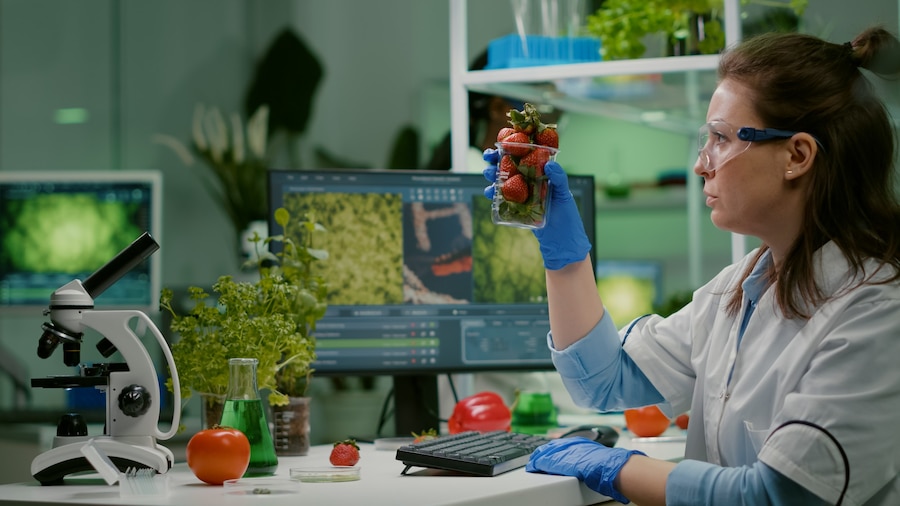So, you’ve earned a degree in agriculture, and you’re wondering, “What can you do with an agriculture degree?” A degree in agriculture equips you with a deep understanding of the agricultural sector, encompassing everything from crop production and livestock management to agribusiness and environmental sustainability. It opens the door to many exciting and meaningful career opportunities. Today, we’ll explore the diverse career paths available to graduates with an agriculture degree. Whether you have a passion for sustainability, a knack for technology, or a passion for the outdoors, there’s a place for you in agriculture. So, what can you do with this valuable knowledge? Let’s find out!
Agricultural Consultant

As an agricultural consultant, you’ll be the go-to problem solver for farmers and agribusinesses. Your role involves closely collaborating with them to identify and tackle challenges in their operations. Drawing upon your expertise, you’ll provide valuable advice on various aspects such as crop management, pest control, and sustainable farming practices. Your recommendations will improve the efficiency and profitability of agricultural endeavors and contribute to environmentally responsible practices.
Farm Manager
An agriculture degree gives you the knowledge and abilities to make your ambition to run your successful farm a reality. The day-to-day operations of farms, including choosing the best crops, nurturing them, and even managing budgets, are the responsibility of farm managers. Your responsibility is to ensure the farm runs efficiently, resulting in abundant harvests.
Agricultural Research Scientist
The pioneers of the farming industry are scientists who do agricultural research. Your insatiable curiosity propels you to investigate and devise cutting-edge techniques to boost crop yields, produce disease-resistant plant types, and advocate sustainable agriculture practices. Your work is crucial to the agriculture sector’s ongoing development and feeding the world’s expanding population.
Agricultural Economist
If you’re intrigued by the economic intricacies of agriculture, a career as an agricultural economist might be your calling. Your role involves deep analysis of market trends, pricing strategies, and economic factors affecting agriculture. By providing data-driven insights, you help decision-makers in the agricultural industry make informed choices, ultimately contributing to its growth and stability.
Food Scientist

Food scientists play a crucial role in safeguarding our food supply. By utilizing their agricultural expertise, they work tirelessly to guarantee that the food we eat is of high quality and safe for consumption. They use their knowledge to develop new food products, improve food preservation methods, and enforce strict food safety regulations to ensure that the food we consume is healthy and of the best possible quality.
Agronomist
Agronomists are crop management and soil science professionals. The fundamental purpose of your farming operations is to increase crop production while reducing environmental effects. With your agriculture degree, you’ll be well-prepared to flourish in this crucial profession, employing sustainable practices that contribute to agricultural productivity and environmental sustainability.
Environmental Consultant
If you’re passionate about sustainability, a career as an environmental consultant in agriculture allows you to align your values with your profession. You’ll work closely with agricultural businesses to minimize their environmental footprint. By implementing responsible and eco-friendly farming practices, you’ll contribute to a more sustainable future for agriculture and the planet.
Livestock Manager
A career as a livestock manager is ideal for those who have an intense passion for animals. In this position, you will oversee the well-being and care of cattle, ensuring that they remain healthy and productive. Your knowledge will help improve efficient and ethical livestock management techniques, which are critical to agriculture.
Seed Analyst
Seed analysts play a critical role in maintaining the quality of seeds, a fundamental element of successful crop production. Your responsibilities include testing and evaluating seeds for genetic purity, germination rates, and overall quality. By ensuring that farmers have access to high-quality seeds, you contribute directly to the success of agricultural endeavors.
Agricultural Education
If you enjoy sharing your expertise, an agriculture degree can lead to a career as an agricultural educator. You are responsible for motivating and educating the next generation of farmers and agricultural professionals. Your direction will give them the necessary skills and information to flourish in this ever-changing sector.
Precision Agriculture Specialist
In our technology-driven world, precision agriculture is at the forefront of innovation. Precision agriculture specialists leverage advanced technologies like drones and GPS to optimize farming practices and increase efficiency. Your expertise in agriculture and technology will play a crucial role in shaping the future of farming.
Agricultural Journalist
Combine your love for agriculture and writing by becoming an agricultural journalist. Your role involves reporting on industry trends, innovations, and agricultural news for various media outlets. You’ll keep the agricultural community and the public informed and engaged by disseminating valuable information.
Horticulturist
Horticulturists are experts in growing fruits, vegetables, and ornamental plants. Your knowledge adds not just to the beauty of landscapes but also to agricultural sustainability. You will devise and implement strategies for growing these plants efficiently and sustainably, improving aesthetics and food production.
Agricultural Inspector
Agricultural inspectors are the gatekeepers of safety and quality in the industry. Your role is to ensure that farms and food processing facilities adhere to safety and quality regulations. By maintaining rigorous standards, you play a pivotal role in safeguarding food safety for consumers.
Biofuel Production Manager
As the world seeks alternative energy sources, biofuels have gained prominence. Biofuel production managers oversee converting crops into biofuels, contributing to a more sustainable energy future. Your role directly impacts the development of renewable energy solutions.
Rural Development Officer
Passionate about rural communities? Rural development officers work to improve the quality of life in rural areas by implementing programs and initiatives that support agricultural communities. Your work fosters economic growth and enhances the well-being of rural residents.
Agricultural Sales Representative
If you possess excellent communication skills and a passion for agriculture, a career as an agricultural sales representative allows you to bridge the gap between farmers and the products and services they need. Your role connects agricultural professionals with the tools and resources that drive success.
Agricultural Policy Analyst
Influencing agricultural policies is vital for the industry’s growth and sustainability. As an agricultural policy analyst, you research and develop strategies to shape local, state, and national agricultural policies. Your work directly impacts the regulatory framework that governs the agricultural sector.
Winery or Brewery Manager
For those passionate about beverages, managing a winery or brewery that relies on agriculture as a primary ingredient can be a rewarding career choice. Your role involves overseeing the production and quality of beverages, showcasing the marriage of agriculture and culinary arts.
Nutritionist
Nutritionists with an agriculture degree specialize in promoting healthy eating habits and educating individuals and communities about the nutritional value of food. Your expertise in both nutrition and agriculture allows you to advocate for healthier food choices and lifestyles.
Hydrologist
Hydrologists study water resources and management, a critical aspect of agriculture. Your expertise is pivotal in addressing water-related challenges in farming, ensuring sustainable water use and resource conservation.
In conclusion, an agriculture degree opens the door to opportunities. Whether you’re passionate about farming, technology, sustainability, or innovation, there’s a place for you in the dynamic field of agriculture. The possibilities are endless, and your journey in agriculture is just beginning. Now that you know what awaits you in agriculture, take the first step toward your dream career. Your degree is your passport to a future filled with growth, discovery, and fulfillment in agriculture.

